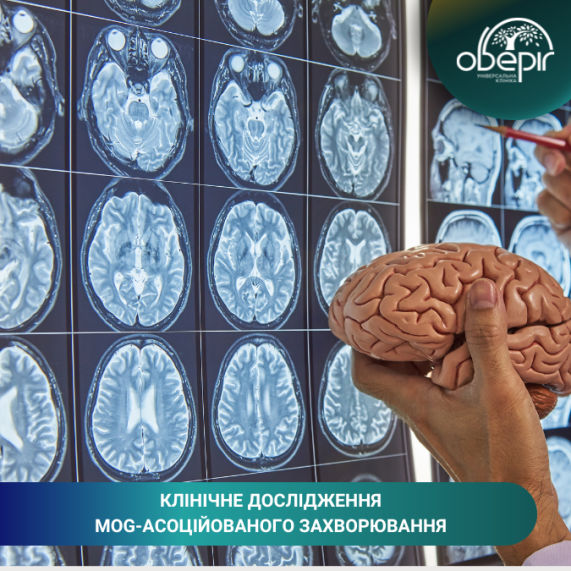Recruitment of patients to the clinical trial MOG-associated disease treatment
3 January 2025


3 January 2025


At the "Oberig" Universal Clinic, recruitment for a clinical study is underway, which provides the opportunity to receive the latest treatment MOG-associated disease ( MOGAD).
Our medical center is one of two in Ukraine where the international MOGAD treatment program is conducted.
If you have a confirmed diagnosis or suspicion of MOGAD, contact our call center.
Contact phone: +38 050 593 56 25, Alina Ivanovna.
Myelin oligodendrocyte glycoprotein antibody disease (MOGAD) is a rare inflammatory disease that affects the central nervous system. In MOGAD, the immune system mistakenly attacks myelin, the protective covering of nerve fibers in the optic nerves, brain, and spinal cord.
MOGAD is often misdiagnosed by confusing it with other diseases that have similar symptoms and also affect myelin, such as multiple sclerosis (MS) or Devic's disease (neuromyelitis optica, neuromyelitis optica spectrum disease, NMOSD).
Symptoms of MOGAD:
- Inflammation of the optic nerve (optic neuritis) - neuritis of the optic nerve - can lead to loss of vision in one or both eyes and pain that worsens with eye movement.
- Inflammation of the spinal cord - transverse myelitis - can cause weakness, increased muscle tone or paralysis of the limbs, loss of sensation, impaired bowel or sexual function.
- Inflammation of the brain and spinal cord - acute disseminated encephalomyelitis - also known as ADEM, can cause vision loss, weakness, unsteady gait and confusion.
Other symptoms of MOGAD may include: seizures, headache, fever.
Course of the disease
Some people have only one attack of symptoms (monophasic MOGAD), while others experience repeated attacks, called recurrent MOGAD.
To confirm MOGAD, doctors usually do:
Magnetic resonance imaging (MRI): to look for inflammation in the optic nerves, brain and spinal cord.
Blood or cerebrospinal fluid test for antibodies to MOG: a positive result confirms the diagnosis.
Treatment:
Clinical studies: a modern immunobiological drug from a Belgian manufacturer can potentially prevent relapses of MOGAD (by blocking the attachment of antibodies to the myelin sheath).
